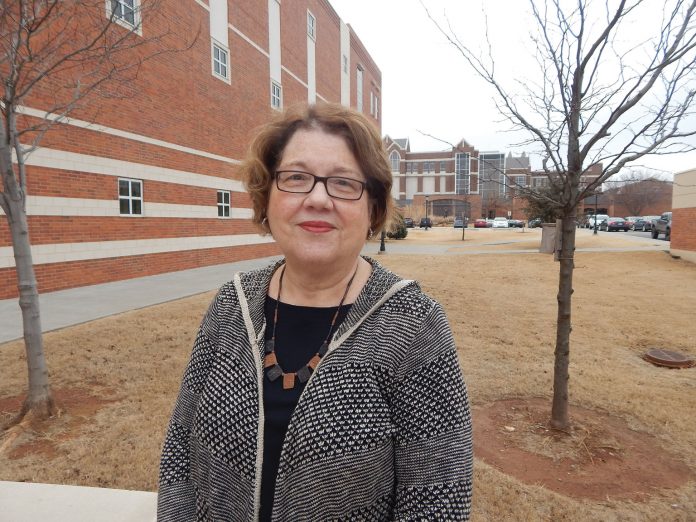
Meeting needs of nursing careers
story and photo by James Coburn
In 2011 the Kramer School of Nursing was considering changes in its curriculum. Associate Professor Carol Mannahan, RN, Kramer School of Nursing and former Kramer Dean Marvel Williamson discussed the need to know that their consumers thought of their curriculum
They were preparing students for the workforce and knew if a change was needed it would be a good idea to communicate with everyone who hires their students.
“As we had suspected for years they were less concerned about the tasks of nursing,” Mannahan said.
Consumers wanted their nurses to be more engaged in problem solving and decision making. They wanted them to know about ethics and to focus more with inter-disciplinary teams.
They met with Lisa Rother, RN, INTEGRIS Health director or Clinical Education and Professional Development. INTEGRIS was and is interested in developing leadership.
“She said, ‘We have these online modules, but they have to have three hours per module processing in person for them to be really valuable,’” Mannahan said.
Kramer began a partnership with INTEGRIS to address the need for clinical faculty across the state. So in 2011 a synergetic academic course was designed for their mutual development.
The INTEGRIS online course became a clinical course designed for continuing education in leadership development. Part of the partnership was a tuition waver for the INTEGRIS students. INTEGRIS provided Kramer with an educator to take clinical groups to the hospital.
“This is the fifth year that we’ve done it, offered a course in both fall and spring for continuing education with academic credit,” Mannahan said.
Two years ago INTEGRIS no longer provided the clinical faculty. They didn’t have the right person, so they began paying Kramer to purchase an adjunct faculty, Mannahan said. Changes have been done every year.
The fall course is called Contemporary Health Care Organizations. It focuses on moving away from traditional hierarchies and bureaucracies to a more complex rapidly changing health care organization.
The spring course is Evolving Health Care Systems to provide an expansive look not only at the unit a nurse works on but a system of health care. They also talk about creating personal leadership.
“We did away this year with the online course, Mannahan said. The students said they would prefer coming to class. Feedback noted the online course was good but they were not getting a lot out of it, she noted.
“When it finally came down to it they said, ‘It’s because we just click through it just to get it done,’” Mannahan said. “They are all managers that are in this course. Some from the director level from team leaders on up. They are always short on time, but they can carve out time to come to class.”
This year the INTEGRIS students come to the class twice a month instead of once a month. Continuing education courses continue once a month for certified nurses to continue their certificates.
“These are all graduate courses we are talking about,” she said.
Those who already have a master’s degree take some of the course for continuing education credits. The ones for academic credit earn three credits for graduate school towards their master’s degree. Students for academic credit work with an interdisciplinary team and have online discussion boards.
“About two years into it we began getting more students in our master’s program from other schools,” Mannahan said of administration management. Special sessions were taught for those students since INTEGRIS has provided the modules.
“For the last three years we’ve had two to four non INTEGRIS students in the course with INTEGRIS,” she explained. “The piece that is the coolest is part of the partnership is for each unit, an INTEGRIS person comes and helps me teach it.” Mannahan teaches theory while INTEGRIS conveys how it applies in their organization.
“Later today I’m teaching on strategic planning,” Mannahan said. “And I’ve got lots of good stuff on strategic planning with what it is and all the steps to it.”
The INTEGRIS person will address how the knowledge is applied on each level of nursing.
“At first we were kind of afraid that the non-INTEGRIS people would think that was not so good. They love it. We’ve had them from OU Medical Center and community health. And it’s just an application whether it’s for their organization or INTEGRIS.”
There is also the privacy of organization ethical point in which no forms are taken from Kramer.
“The non INTEGRIS students love it. They just think it has been interesting,” she said.












